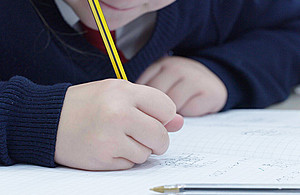Supporting engagement in learning for primary pupils when direct communication is limited
Insights from a large urban primary school which is part of a small multi-academy trust of primary schools with a high level of pupils who speak English as an additional language (EAL).

pupil-writing
Our school is in the process of creating and sharing a parent-friendly curriculum expectations guide for each year group and subject area, so that parents are aware of the age-related expectations for their children. This will be especially useful for those families for whom internet access is challenging.
Supporting families and pupils who are less connected or active online
Where pupils are not accessing their work, the teacher will first contact the parents, then the assistant headteacher and finally the headteacher if required. Where calls are not answered, Parent Mail is used to communicate with families. 100% of our families use Parent Mail so this is a helpful communication channel for all families.
Our less responsive pupils are monitored closely by year group leads. If it is felt that this lack of activity means that they become vulnerable, our school is offering parents and families the option to send the pupil to school where we can ensure that they have some time to complete their online work.
Engagement with the curriculum
Pupils are being set daily foundation subject tasks to ensure that they do not only focus on maths and literacy. These tasks are as open-ended as possible, and sometimes take the form of project work.
The school is ensuring that all subjects are still covered over the course of 2 weeks, and that lessons are adapted from the existing lesson plans where possible, partly to minimise workload and partly to make sure learning continues.
When work is set online, clear expectations of work are set out. When work is not completed to a good standard, this is addressed through feedback to pupils and parents where necessary.
The Department for Education gathered these examples of remote education practice by consulting with schools and colleges across England. Names of individuals and schools have been removed to protect their privacy.